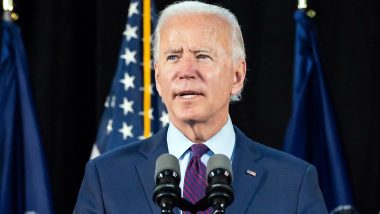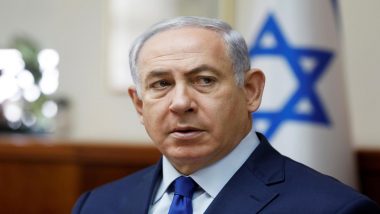Washington, Jun 4: President Joe Biden is looking past resistance from key Israeli officials as he presses Israel and Hamas to agree to a three-phase agreement that could immediately bring home dozens of Israeli hostages, free Palestinian prisoners and perhaps even lead to an endgame in the nearly eight-month-old Gaza war. Biden's big swing -- during a tough re-election battle -- could also demonstrate to a significant slice of his political base demoralised by his handling of the conflict that he's doing his part to end the war that has killed more than 36,000 Palestinians and left hundreds of thousands struggling to meet basic needs.
White House officials on Monday said Biden's decision to make public what it describes as an Israeli proposal -- just one day after it was delivered to Hamas -- was driven by a desire to put Hamas on the spot. The move diverged from the US administration's position throughout the conflict to allow the Israelis to speak for themselves about hostage negotiations. "The president felt that where we are in this war, where we are in the negotiations to get the hostages out, that it was time for a different approach and a time to make the proposal public, to try to energise the process here and catalyse a different outcome," White House national security spokesman John Kirby said. Israel-Palestine War: Nikki Haley Writes ‘Finish Them’ on Israeli Shell, Picture Surfaces
Almost immediately after Biden detailed the proposal -- which includes a ceasefire and phased Israeli troop withdrawal from Gaza if Hamas releases all hostages -- Prime Minister Benjamin Netanyahu's office said it would continue its war until Hamas was destroyed.
NETANYAHU FACING PRESSURE FROM FAR-RIGHT
Netanyahu's political survival depends on a far-right coalition that is adamant about eradicating Hamas. He sowed further doubt about proposal's viability Monday when he told an Israeli parliament committee that there are certain "gaps" in how Biden laid out the proposal. The prime minister said Israelis "reserve the right to return to war". Kirby played down differences between Biden and Netanyahu and underscored that the proposal was an Israeli one.
But even if Hamas agreed to terms, it would require Netanyahu to make some difficult political calculations. Two leading members of his far-right coalition -- National Security Minister Itamar Ben-Gvir and Finance Minister Bezalel Smotrich -- have threatened to leave Netanyahu's government if he signs off on the proposal. That would cause the coalition to collapse. Smotrich said Monday that agreeing to a ceasefire would amount to a humiliation of Israel and a surrender. Rafah News: Fresh Israeli Attacks Kill Dozens in Rafah, Say Palestinian Medics
Netanyahu has also faced pressure from families of hostages -- officials say about 80 people captured by militants in the October 7 attack are still alive and Hamas is holding the bodies of 43 others -- to reach an agreement to free their loved ones. Opposition leader Yair Lapid, however, vowed over the weekend to provide a political safety net to Netanyahu, ensuring his government would not fall over the deal.
OPTIMISM DESPITE HEADWINDS
Even as the proposal faces stiff headwinds, the Biden administration said it was cautiously optimistic that a deal could be reached. White House national security advisor Jake Sullivan urged world leaders to rally behind the proposal. "They need to train their eyes on Hamas this week and say it's time to come to the table to do this deal," Sullivan said in an appearance at the US Global Leadership Conference in Washington.
To that end, Biden on Monday spoke with Sheikh Tamim bin Hamad Al Thani of Qatar, a key Hamas interlocutor, and said it was "the best possible opportunity for an agreement", the White House said. Sullivan, meanwhile, spoke to his Turkish counterpart, Akif Cagatay Kilic, about Turkey using its influence with Hamas to get them to accept the proposal. Turkish President Recep Tayyip Erdogan has defended Hamas and hosted the group's political leader, Ismail Haniyeh, for talks in April. Group of Seven leaders on Monday also endorsed the deal.
EVEN GETTING TO PHASE ONE IS A CHALLENGE
Biden acknowledged last week that getting beyond the first phase of the proposal would be difficult. The first phase would last for six weeks and would include a ceasefire, a withdrawal of Israeli forces from all densely populated areas of Gaza and the release of a number of hostages, including women, the elderly and the wounded, in exchange for the release of hundreds of Palestinian prisoners.
The Israelis, under the proposal, would also allow 600 humanitarian aid trucks into Gaza each day during the first phase. The second phase would include the release of all remaining living hostages, including male soldiers, and Israeli forces would withdraw from Gaza. Hamas is likely to make enormous demands about which Palestinian prisoners will be released and call on Israel to assure that it won't continue to target top Hamas leaders. Indeed, Israeli officials view the conflict on a far longer timeline.
Just last week, Israeli national security advisor Tzachi Hanegbi said he expected the war to drag on for another seven months, in order to destroy the military and governing capabilities of Hamas and the smaller Islamic Jihad militant group. But with Election Day in the US now just over five months away, Biden faces tightening pressure to more quickly resolve the Mideast conflict that's left him bleeding support.
(This is an unedited and auto-generated story from Syndicated News feed, LatestLY Staff may not have modified or edited the content body)













 Quickly
Quickly














 GT
GT







